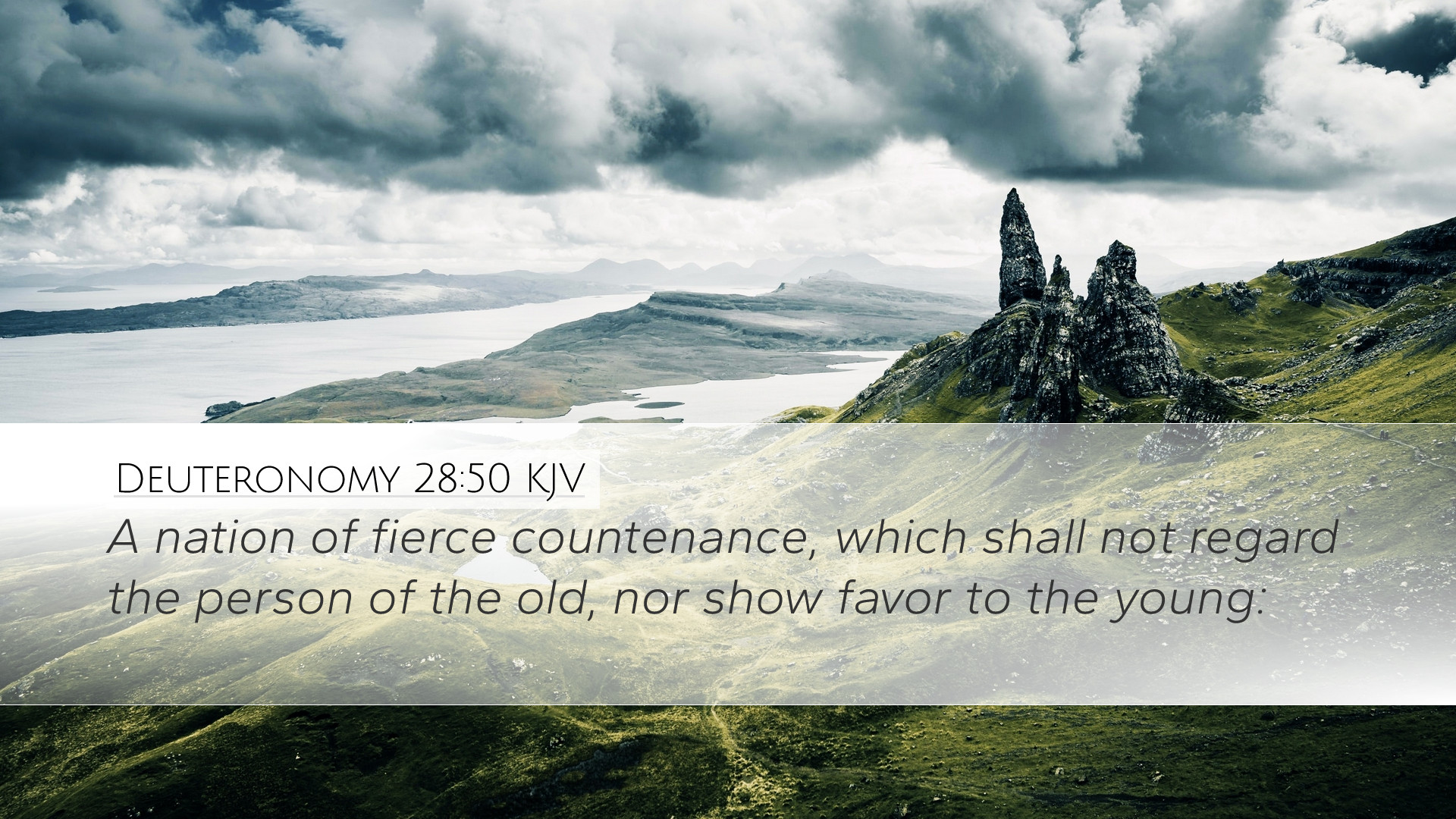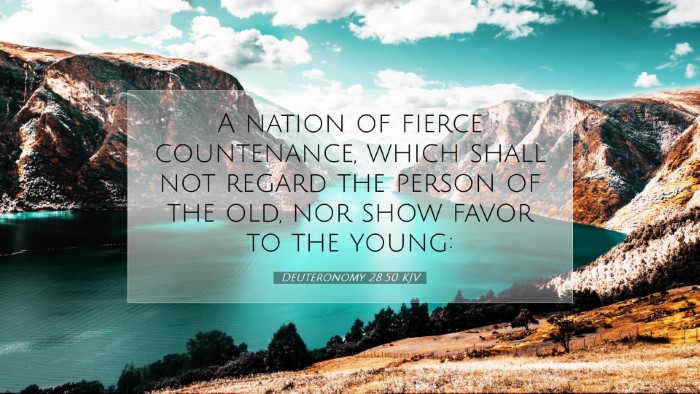Commentary on Deuteronomy 28:50
Bible Verse: "A nation of fierce countenance, which shall not regard the person of the old, nor show favor to the young." - Deuteronomy 28:50
Introduction
This verse is part of a larger passage where Moses conveys to the Israelites the blessings and curses that accompany obedience or disobedience to God's commandments. Here, it emphasizes the severity of judgment that can come upon the people, particularly through an invading nation characterized by brutal and ruthless attributes.
Context and Background
The historical context of this verse reflects the condition of the Israelites during their journey through the wilderness and their proximity to the Promised Land. Moses, aware of the temptations and challenges that lie ahead, calls attention to the consequences of turning away from God’s laws.
This prophecy offers both a warning and a demonstration of God's justice. As the Israelites contemplate entering Canaan, they are reminded of the importance of fidelity to God’s covenant.
Exegesis of Deuteronomy 28:50
Moses portrays the invading nation as having a “fierce countenance,” indicating a ferocity and an intimidating presence. This description not only highlights the physical prowess of the enemy but also suggests a psychological tactic to instill fear among the Israelites.
Analysis of Key Phrases
- A nation of fierce countenance: Matthew Henry notes that the description suggests a nation that is not only aggressive but also one that possesses a savage demeanor, willing to inflict brutality without hesitation.
- Which shall not regard the person of the old: This speaks to the complete lack of compassion or respect for the elderly, underlining the moral decline that accompanies a society that turns away from God.
- Nor show favor to the young: The absence of mercy extends beyond the old to the innocent and vulnerable, indicating universal disregard for human life in times of judgment. Albert Barnes emphasizes how this lack of compassion signifies the spiritual desolation of the invading nation.
Theological Implications
The brutal nature of this prophesied nation underscores a critical theological theme in the Bible—God's sovereignty over nations and His ability to use one people as an instrument of judgment against another. Adam Clarke elaborates on this by articulating that even nations are subject to God’s will, and their rise and fall can serve divine purposes.
Divine Justice and Judgment
The moral decay represented by this fierce nation serves as a reflection of what happens when people forsake God’s ordinances. This delineation between those who uphold God’s promises and those who fall into judgment can be seen throughout biblical history and serves as a timeless warning for contemporary society.
Covenantal Aspects
The Israelites are intricately linked to God through a covenant, which promises blessings for obedience and curses for disobedience. This verse serves as a reminder of what is at stake when they choose to disregard God’s laws. It poses pertinent questions to pastors and theologians about the nature of covenant relationship and the responsibilities it entails.
Application for Today
For modern believers, understanding the severity of the warning in Deuteronomy 28:50 is essential. Pastors and theologians can draw parallels between the fierce nation and modern entities that display cruelty and disregard for life. It serves as a prompt to cultivate hearts that are aligned with God's compassion, particularly towards the vulnerable in society.
Historical Examples
The commentary of Henry suggests that historical recollections can be drawn upon, where nations have indeed turned to violence and oppression when they cast aside moral responsibilities. The text challenges believers not to turn a blind eye to the needs of the elderly and young, as a reflection of their faith in action.
Encouragement to Obedience
Moses’ exhortation extends beyond mere warnings; it underscores the importance of a life lived in accordance with God’s commands. This reflects the overarching narrative of redemption throughout scripture, reinforcing the transformative nature of obedience.
Conclusion
Deuteronomy 28:50 stands as a sobering reminder of the consequences that arise from a disengaged and unfaithful walk with God. It warns against falling into the hands of nations characterized by brutality, urging a return to God’s statutes and a life reflective of His love and justice.
The insights from Matthew Henry, Albert Barnes, and Adam Clarke provide a rich historical and theological tapestry that enhances our understanding of this scripture. It demands attention from pastors, scholars, and theologians who seek to prepare the Church to face the challenges of a world where moral decay seems rampant.
References
This commentary incorporates insights from:
- Matthew Henry's Commentary
- Albert Barnes' Notes on the Bible
- Adam Clarke's Commentary on the Bible


